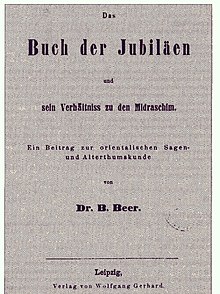Bernhard Beer
Bernhard Beer (born 20th July 1801 in Dresden , died 1. July 1861 ibid) was the first community leaders founded in 1837 the Jewish religious community in Dresden , scholar, founder of the Moses Mendelssohn Society and an honorary doctorate of the University of Leipzig .
Live and act
In Dresden as the son of Hirsch Beer (1770–1837) and his wife Clara, b. Born Bondi (1767–1838), he willingly followed his parents' wish to acquire secular knowledge in addition to religious knowledge. At that time, this was only possible for Jews in Dresden through self-study. He received support from the language teacher Rudolph Meyer and, above all, the support of the Bondi family.
It was only at the age of 23 in 1824 that he began to hold scientific evening entertainments, in which the younger generation in particular exchanged ideas about works of religious philosophy. In 1826 he introduced the first innovations, such as the German-language sermon or confirmation. In all efforts to reform, he was always anxious to find a compromise with Orthodox Judaism, thereby earning a high degree of reputation.
In 1829, on his initiative, the Dresden Mendelssohn Association was founded to encourage young Jews to turn to science, arts and crafts. His sermon, given by Moses Mendelssohn on the 100th birthday , is considered the foundation's charter .
From 1837 to 1848 and from 1853 to 1861 he was the head of the Jewish community in Dresden . He is considered to be the main initiator of the appointment of Zacharias Frankel as chief rabbi to Dresden.
Beer published his research paper “The Book of Anniversaries and His Relationship to the Midrashim . A contribution to oriental legends and antiquity ”(Leipzig, Verlag von Wolfgang Gerhard). Beer also analyzed Jewish literature and its halachic writings, mystical- cabalistic works, stories, sagas, moral textbooks and Hebrew poetry up to the year 1840. For these works he received, probably inspired by Wilhelm Traugott Krug (1770–1842), In 1834 he was awarded an honorary doctorate from Leipzig University as Dr. phil. hc
In his extremely extensive journalistic activities and participation in almost all early Jewish press ventures, Beer was particularly committed to the emancipation of the Jews in Saxony and, on the one hand, faced great resistance, on the other hand, he found comrades-in-arms such as Wilhelm Krug. In 1830/31 he was also one of the first to fulfill his civic duty despite previously denied civil rights and join the Dresden municipal guard.
But he was also politically active: on May 15, 1837, he asked the second chamber of the meeting of the estates whether “Saxony was a fatherland for its fellow believers”. Beer also criticized Saxony to the effect that “a country which does not recognize the full citizenship of the Jews restricts their stay to two places, excludes them from any property and prohibits them from all honorable offices and trades, grants the freedom they need to exercise those in the draft law to be able to make the required essential changes in terms of education and religion. "
His house developed into a center of intellectual and artistic life, which was also thanks to his aesthetically and artistically educated wife Berta.
His grave is in the old Jewish cemetery in Dresden . He donated his extensive library to the universities in Leipzig and Breslau in equal parts.
literature
- Abraham Geiger : Beer, Bernhard . In: Allgemeine Deutsche Biographie (ADB). Volume 2, Duncker & Humblot, Leipzig 1875, p. 246 f.
- Ernst Gottfried Lowenthal: Beer, Bernhard. In: New German Biography (NDB). Volume 1, Duncker & Humblot, Berlin 1953, ISBN 3-428-00182-6 , p. 734 f. ( Digitized version ).
- Gunda Ulbricht: Beer, Bernhard (Hebrew Jissachar) . In: Institute for Saxon History and Folklore (Ed.): Saxon Biography .
- Kerstin Hagemeyer: Jewish life in Dresden. Exhibition on the occasion of the consecration of the new Dresden synagogue on November 9, 2001 . Saxon State Library - Dresden State and University Library, Berlin 2002, ISBN 3-910005-27-6 .
- Simone Lässig: Bernhard Beer . In: Jewish Community of Dresden, State Capital Dresden (Ed.): Once & Now. On the history of the Dresden synagogue and its community . ddp goldenbogen, Dresden 2003, ISBN 3-932434-13-7 , pp. 140–141.
Web links
- Bernhard Beer's biography on Jews in Central Saxony
- Literature by and about Bernhard Beer in the Saxon Bibliography
Individual evidence
- ↑ Hagemeyer, pp. 79, 80.
- ↑ Hagemeyer, p. 79.
- ↑ Hagemeyer, pp. 92, 94
- ↑ Lässig, p. 140
- ↑ a b Hagemeyer, p. 90
| personal data | |
|---|---|
| SURNAME | Beer, Bernhard |
| BRIEF DESCRIPTION | Scholar |
| DATE OF BIRTH | July 20, 1801 |
| PLACE OF BIRTH | Dresden |
| DATE OF DEATH | July 1, 1861 |
| Place of death | Dresden |



